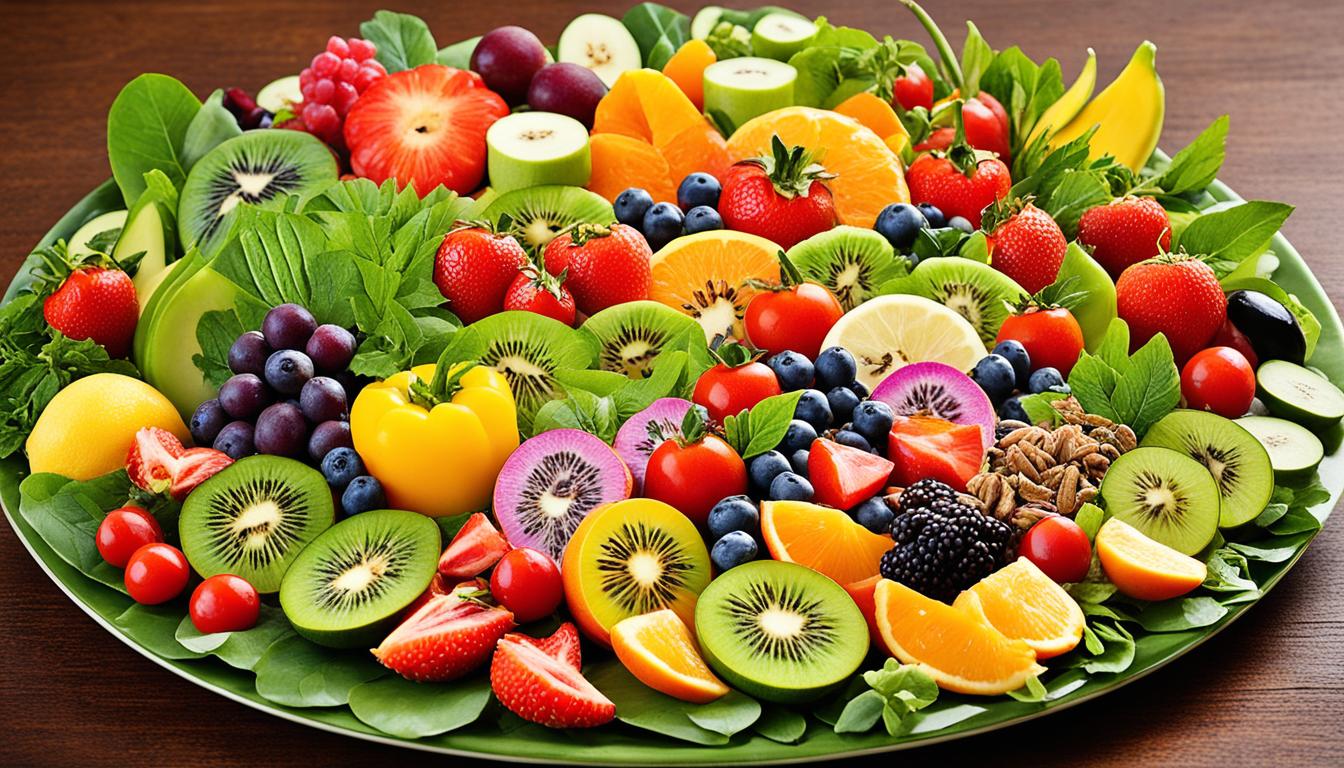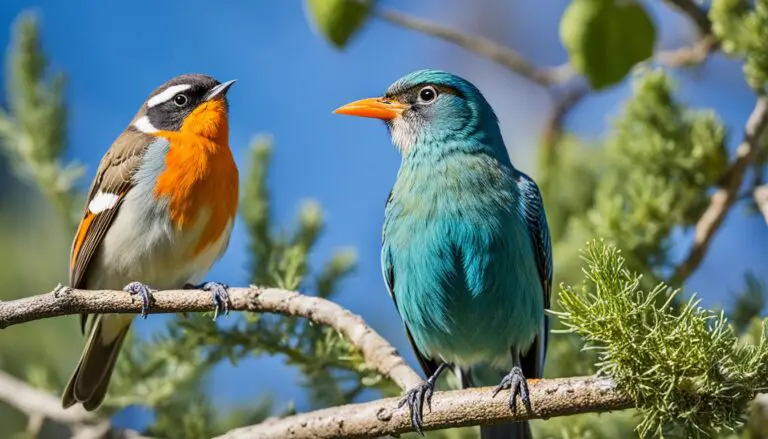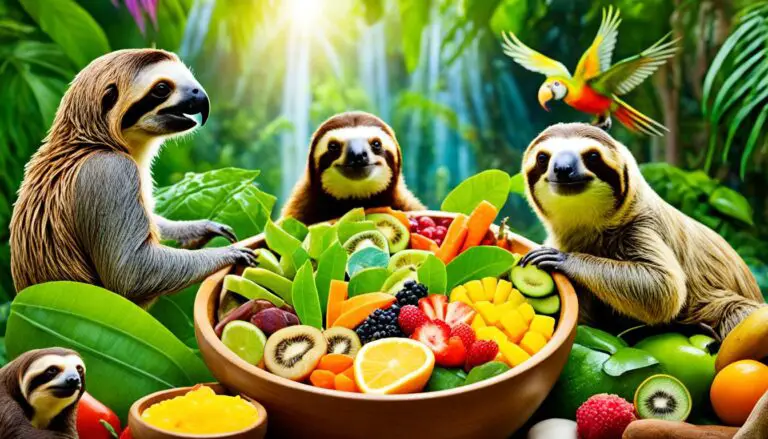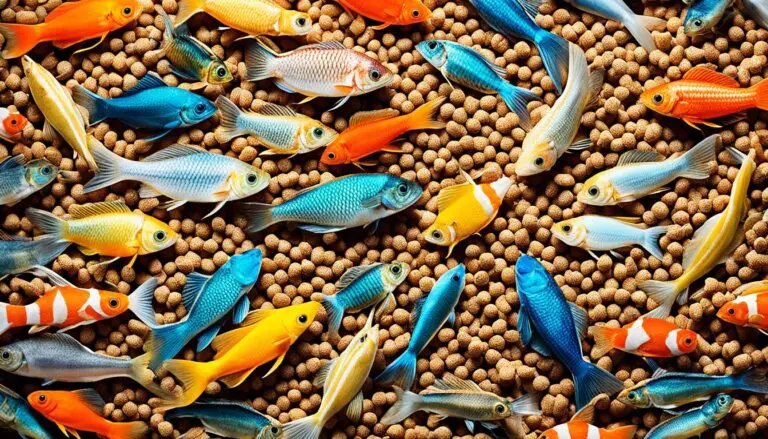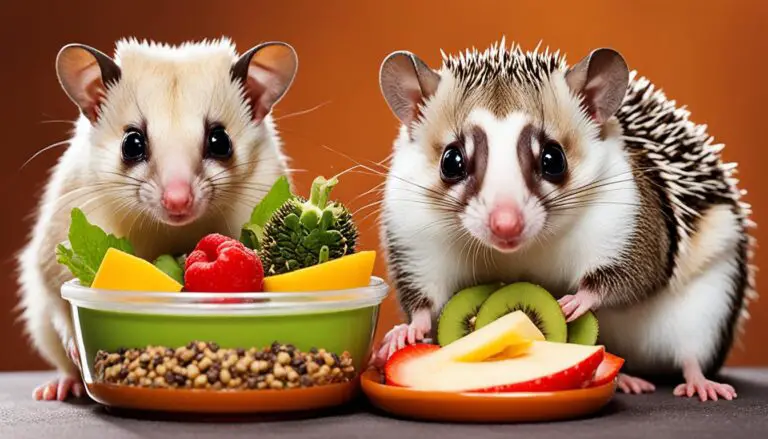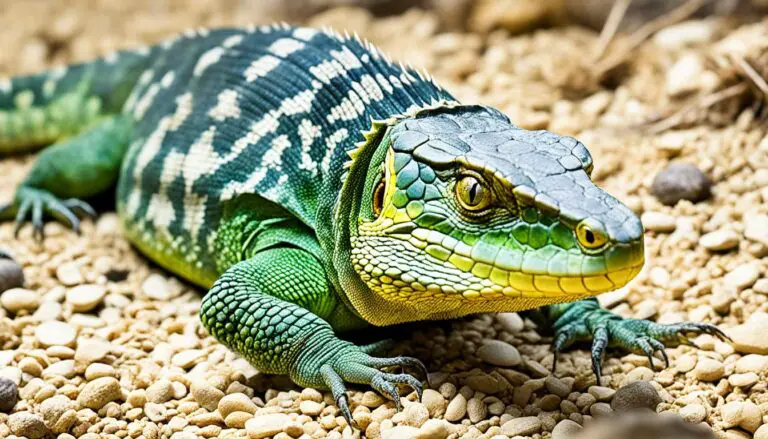Formulating Balanced Diets for Exotic Pets
Did you know that providing a balanced diet is crucial for the health and well-being of exotic animals? Incorrect nutrition can lead to a wide range of health problems and diseases. When it comes to feeding exotic pets, understanding their natural history and dietary requirements is essential for effective nutritional management. Factors such as age, life stage, and species-specific needs should be considered when formulating a diet plan for these unique pets.
Key Takeaways:
- Providing a balanced diet is essential for the overall health and well-being of exotic pets.
- Incorrect nutrition can lead to various health issues in exotic animals.
- Understanding the specific nutritional needs of each species is crucial.
- Factors such as life stage and species-specific requirements should be taken into consideration when formulating a diet plan.
- By following proper nutrition guidelines, pet owners can help ensure the longevity and well-being of their unique pets.
The Importance of Proper Nutrition for Exotic Animals
Proper nutrition plays a vital role in the health and well-being of exotic animals. Just like humans, these unique pets have specific dietary requirements that must be met to ensure their optimal health. Providing a balanced diet that meets their dietary needs is essential to prevent various health issues associated with incorrect nutrition.
Many diseases in exotic pets can be linked to or caused by inadequate nutrition. For instance, a diet lacking essential nutrients can weaken their immune system, making them more susceptible to infections and diseases. It is crucial for pet owners to be aware of the dietary requirements of each species and develop specialized diets accordingly.
Different life stages and breeding phases may require different dietary needs. For example, growing animals need higher levels of certain nutrients to support their development, while breeding females may require additional nutrients to support pregnancy and lactation.
Creating nutrition plans for exotic species involves thorough research and understanding of their natural diet in the wild. This knowledge helps to identify the specific nutritional needs of each species. By formulating a diet that closely mimics their natural diet, pet owners can ensure that their exotic pets receive the right balance of nutrients.
Incorrect nutrition can have detrimental effects on the health and well-being of exotic animals. By providing specialized diets that meet their dietary requirements, pet owners can help prevent various health issues. A balanced diet is crucial for the overall wellness of these unique pets.
When it comes to exotic animals, there is no one-size-fits-all approach to nutrition. Each species has its own dietary preferences and needs. Some exotic pets, like reptiles, have specific dietary requirements that include a variety of insects, while others, like birds, require a balanced diet that includes fruits, vegetables, and legumes.
It is essential for pet owners to consult with a veterinarian or a qualified exotic animal nutritionist to develop appropriate nutrition plans for their pets. These professionals can provide guidance on the specific dietary requirements of each species and help create balanced and specialized diets to meet those needs.
Providing proper nutrition is not only important for the physical health of exotic animals but also for their mental well-being. A well-nourished pet is likely to be more active, playful, and less prone to behavioral issues.
Remember, every exotic pet is unique, and their dietary needs should be treated with care and attention. By prioritizing proper nutrition and creating specialized diets, pet owners can ensure that their exotic pets live healthy and fulfilling lives.
Dietary Requirements for Exotic Pets
Exotic pets have specific dietary requirements that must be met for their optimal health. These dietary requirements vary from species to species, depending on their natural habitat and feeding behavior. It is crucial to understand these requirements and provide a balanced diet that meets their nutritional needs.
| Species | Dietary Requirements |
|---|---|
| Rabbits | Rabbits are herbivores and require a diet rich in fiber, including hay, leafy greens, and limited pellets. They also practice caecotrophy, consuming soft feces for additional nutrients. |
| Ferrets | Ferrets are obligate carnivores and require a high-energy diet rich in animal-based proteins and fats. They have a short gastrointestinal tract and should be fed multiple small meals throughout the day. |
| Hedgehogs | Hedgehogs require a balanced diet consisting of commercial hedgehog food supplemented with vitamin-enriched insects. Feeding them high-fat cat food can lead to obesity and other health issues. |
Each species of exotic pet has its own unique dietary requirements that must be met for their optimal health. Understanding these requirements and providing a balanced and specialized diet is essential in ensuring the well-being of these unique pets.

Nutrition for Small Mammals
Many exotic small mammals, such as guinea pigs, rabbits, and hamsters, are herbivorous and require a balanced small herbivore diet to maintain their overall health and well-being. A well-formulated diet is essential to meet their specific dietary requirements and promote optimal nutrition.
Dental health plays a crucial role in the overall well-being of small mammals. A diet rich in dental health in small mammals requires both digestible and indigestible fiber. The abrasive action of the fiber on their teeth helps prevent dental disease and maintains proper dental wear. Providing an adequate amount of fiber also stimulates their appetite and promotes healthy gut motility.
“A diet high in starches and refined sugars can be detrimental to the health of small mammals, leading to intestinal diseases. It’s important to avoid feeding them foods that are high in these ingredients.”
Small mammals have a delicate digestive system, and they are prone to intestinal diseases if their diet contains high levels of starches and refined sugars. These types of diets can disrupt their intestinal flora and cause gastrointestinal issues. A high starch diet and intestinal disease in small mammals can lead to diarrhea, bloating, and discomfort. Therefore, it is crucial to provide them with a balanced diet that is low in starches and refined sugars.

The Components of a Balanced Small Herbivore Diet:
- High-quality timothy hay or other grass hays
- Fresh leafy greens and vegetables (such as kale, spinach, and romaine lettuce)
- Safe herbs and flowers (such as parsley, cilantro, and dandelion leaves)
- Small amounts of fruits (such as apples, berries, and melon)
- Small amounts of pellets formulated specifically for small herbivores
When feeding small mammals, it is important to introduce new foods gradually and monitor their response. It is also essential to provide them with fresh water at all times.
By understanding the dietary needs of small mammals and providing a balanced small herbivore diet, pet owners can ensure the overall health and well-being of their furry companions.
Nutrition for Rabbits
Domestic rabbits are true herbivores and require a diet rich in fiber. Providing a balanced diet is essential for their overall health and well-being. Let’s explore some important aspects of rabbit nutrition.
Caecotrophy: A Vital Process
One fascinating aspect of rabbit nutrition is caecotrophy. These animals have a unique digestive system that allows them to consume soft feces called cecotropes. Caecotrophy serves as a vital process for rabbits to obtain additional vitamins and proteins from their diet. It helps in optimal nutrient absorption and aids in maintaining their overall health.
Watch Out for Calcium Levels
Another important consideration when it comes to rabbit nutrition is maintaining appropriate calcium levels in their diet. While calcium is necessary for their bone health, excessive calcium consumption can lead to urinary tract disorders. It is crucial to monitor and provide a balanced diet that meets their calcium requirements and prevents such health issues.
Preventing Hairballs and Dental Disease
A common concern for rabbit owners is the formation of hairballs and dental disease. Rabbits naturally groom themselves, which can result in the ingestion of fur. Insufficient fiber in the diet can lead to hairballs, causing blockages in their digestive system. Additionally, a diet that lacks roughage can contribute to dental disease, as rabbits need to chew on fibrous materials to keep their teeth healthy.
To prevent these problems, it is essential to provide a diet that includes:
- High-fiber hay
- Leafy greens
- Fresh vegetables
- Occasional fruits as treats
Additionally, pellets formulated specifically for rabbits can be included in their diet, but they should not be the sole source of nutrition.
Summary of Rabbit Nutrition
| Dietary Considerations | Effects on Rabbits |
|---|---|
| Caecotrophy | Aids in nutrient absorption and overall health |
| Calcium Levels | Prevents urinary tract disorders |
| Hairballs and Dental Disease | Proper fiber intake prevents blockages and maintains dental health |

Nutrition for Hystricomorph Rodents
Hystricomorph rodents like chinchillas, guinea pigs, and degus have specific dietary requirements that are crucial for their health and well-being. As herbivores, they need a balanced diet that includes fresh hay, species-specific pellets, and leafy green vegetables.
One of the common dental diseases in hystricomorph rodents is dental disease. This can occur when there is a lack of fibrous roughage in their diet. Chewing on hay and other fibrous materials helps wear down their continuously growing teeth, preventing dental problems.
Another important consideration is calcium-related problems in guinea pigs. While calcium is necessary for their health, an excess of dietary calcium can lead to urinary tract problems. It is essential to provide guinea pigs with a balanced diet that meets their calcium requirements without excessive supplementation.
Additionally, guinea pigs have an absolute requirement for vitamin C. Unlike most animals, guinea pigs cannot produce their own vitamin C and need to obtain it from their diet. A deficiency in vitamin C can lead to scurvy, a serious and potentially fatal condition in guinea pigs. It is crucial to provide them with an adequate vitamin C intake through fresh fruits and vegetables.
By understanding and meeting the specific nutritional needs of hystricomorph rodents, owners can help ensure their pets’ overall health and prevent common dental and urinary tract problems.

The Importance of Fiber in the Diet of Hystricomorph Rodents
Fiber plays a crucial role in the diet of hystricomorph rodents like guinea pigs. It is essential for maintaining proper digestive health, preventing obesity, and promoting normal bowel movements.
“A diet high in fiber helps to maintain the natural motility of the gastrointestinal tract in guinea pigs, preventing digestive issues and promoting overall gut health.” – Dr. Jane Roberts, Exotic Animal Nutrition Expert
Hay is an excellent source of dietary fiber for hystricomorph rodents. It provides both digestible and indigestible fiber, which helps stimulate appetite, improve digestive function, and prevent intestinal blockages. A diet rich in fresh hay should be the foundation of their nutrition.
Additionally, leafy green vegetables such as kale, collard greens, and parsley are also rich in fiber and should be included in their diet. However, it is important to introduce new foods gradually and monitor the rodents’ response to prevent any digestive upset.
Meeting Calcium Requirements in Hystricomorph Rodents
Calcium is an essential mineral for hystricomorph rodents, but excessive dietary calcium can lead to urinary tract problems. It is important to provide a balanced diet that meets their calcium needs without over-supplementing.
Species-specific pellets formulated for hystricomorph rodents usually contain the right amount of calcium to meet their requirements. Avoid feeding them excessive amounts of high-calcium foods like alfalfa hay or leafy greens high in oxalates, as these can contribute to the development of urinary tract disorders.
To ensure proper calcium utilization, it is also important to maintain the correct calcium to phosphorus ratio in their diet. The ideal ratio for hystricomorph rodents is 1:1 to 1.5:1.
Vitamin C Requirements for Guinea Pigs
Vitamin C is crucial for the health of guinea pigs, as they have an absolute requirement for this vitamin. A deficiency in vitamin C can lead to scurvy, characterized by symptoms such as weight loss, tooth loss, and swollen joints.
Guinea pigs should receive a diet that includes a variety of fresh fruits and vegetables rich in vitamin C, such as bell peppers, kiwi, and strawberries. Vitamin C supplements may also be necessary, especially for guinea pigs that have a higher requirement due to illness or stress.
It is important to note that vitamin C degrades quickly, especially when exposed to light and air. Therefore, it is best to provide fresh fruits and vegetables daily and ensure they are stored properly to maintain their vitamin C content.
Nutrition for Carnivores – Ferrets
Ferrets are obligate carnivores and require a high-energy diet rich in protein and fat. Their short gastrointestinal tract and rapid gut transit time necessitate regular feedings every three to four hours. Ferrets need a low-fiber diet to maintain their health. Providing a balanced, high-quality diet that meets their nutritional needs is crucial for the well-being of ferrets.
High-Energy Diet for Ferrets
A high-energy diet is essential for the optimal health and vitality of ferrets. Due to their carnivorous nature, they require a diet that is rich in protein and fat. Protein is a crucial component for muscle development, tissue repair, and overall growth. Fat provides the necessary energy for their highly active lifestyle.
When selecting food for ferrets, opt for high-quality commercial diets specifically formulated for ferrets. These diets are formulated to meet the nutritional needs of ferrets and contain the necessary protein and fat levels required for their well-being. Avoid feeding them dog or cat food, as it may not provide the high-energy diet that ferrets require.
Low Fiber Diet for Ferrets
Ferrets have a short gastrointestinal tract and are unable to efficiently digest high levels of fiber. A low-fiber diet is necessary to prevent gastrointestinal issues such as intestinal blockages and diarrhea. When selecting food for ferrets, choose options that are low in fiber to support their digestive health.
Popular options for a low-fiber diet for ferrets include high-quality ferret-specific kibble and raw food diets. These diets are formulated to provide the appropriate balance of nutrients while minimizing fiber content to maintain optimal digestive function.
Feeding Frequency for Ferrets
Due to their unique digestive system, ferrets have a high metabolic rate and require regular feedings throughout the day. Feeding them every three to four hours ensures they receive a continuous supply of energy and nutrients.
When planning the feeding schedule for your ferret, aim for four to six small meals per day. This frequent feeding pattern mimics their natural eating habits and helps prevent blood sugar fluctuations. Consult with your veterinarian for precise feeding guidelines based on your ferret’s age, size, and activity level.
Nutrition for Insectivores – Hedgehogs
When it comes to hedgehog nutrition, providing a suitable diet is crucial for their overall health and well-being. Hedgehogs are insectivores and have specific dietary requirements that need to be met. Feeding them a commercial hedgehog diet is recommended as it is specially formulated to provide the necessary nutrients these unique animals need.
One important aspect of a suitable hedgehog diet is the inclusion of high-protein cat food. While hedgehogs are insectivores, they can also benefit from the protein content found in cat food. However, it’s important to choose a cat food that is low in fat and provides a balanced amount of protein. Obesity is a common health issue in hedgehogs, so it’s essential to monitor their weight and prevent excessive weight gain.
“Feeding hedgehogs a diet that is too high in fat or inadequate in protein can lead to obesity and dental disease.”
Dental disease is another concern when it comes to hedgehog nutrition. By providing a suitable diet, you can help maintain their dental health and prevent potential issues. Additionally, it’s crucial to supplement their diet with vitamin-enriched insects to ensure they receive essential nutrients for optimal health.
Recommended Hedgehog Diet:
| Food | Description |
|---|---|
| Commercial Hedgehog Diet | A specially formulated food designed to meet the nutritional needs of hedgehogs. |
| High-Protein Cat Food | A cat food that is low in fat and provides a balanced amount of protein. |
| Vitamin-Enriched Insects | Insects that are supplemented with essential vitamins to ensure a well-rounded diet. |
By following a suitable diet and providing the necessary nutrients, you can ensure your hedgehog’s optimal health and well-being. Monitoring their weight and dental health are essential aspects of hedgehog care. A balanced and nutritious diet sets the foundation for a happy and thriving hedgehog.
Nutrition for Birds
Birds have specific dietary needs that vary among species. Providing a balanced diet is crucial for their overall health and well-being. Let’s explore the key aspects of avian nutrition, including the importance of a balanced diet, the role of essential nutrients, and the need for vitamin and mineral supplementation.
Carbohydrates, fats, and essential amino acids are essential components of a bird’s diet. These nutrients provide energy, support growth and development, and help maintain the bird’s overall health. However, it’s important to note that seeds alone are not sufficient for a balanced diet and may lead to nutritional deficiencies. To ensure optimal nutrition, a variety of foods should be included in a bird’s diet.
Fruits, vegetables, and legumes should be incorporated into a bird’s diet to provide essential nutrients such as vitamins, minerals, and antioxidants. These foods contribute to the overall well-being of the bird and help support various bodily functions.
While pelleted feeds can serve as a base for a balanced diet, it is essential to supplement them with fresh fruits and vegetables to provide variety and additional nutrients. This combination ensures that birds receive a well-rounded and complete diet.
Furthermore, some bird species may require specific vitamin and mineral supplementation to meet their nutritional needs. Consulting with a veterinarian knowledgeable in avian nutrition can help determine if additional supplementation is necessary for your feathered friend.
| Key Nutrients for Avian Nutrition | Food Sources |
|---|---|
| Carbohydrates | Fruits, vegetables, legumes |
| Fats | Nuts, seeds, oily fish |
| Essential Amino Acids | Poultry, lean meats, eggs, legumes |
| Vitamins | Fruits, vegetables, fortified pelleted feeds |
| Minerals | Cuttlebone, mineral blocks, fresh greens |
Birds have unique nutritional needs that should be catered to with a diverse and well-balanced diet. Providing a mix of carbohydrates, fats, and essential amino acids ensures they receive the necessary energy and building blocks for their overall health. Supplementing with fresh fruits and vegetables, along with appropriate sources of vitamins and minerals, is key to supporting their specific dietary requirements.
Understanding Your Bird’s Dietary Needs
It’s important to remember that each bird species has its own specific dietary requirements. Some birds, like parrots, may benefit from a diet that closely resembles what they would consume in the wild, including a variety of fruits, vegetables, and nuts. On the other hand, seed-eating birds, such as finches, should have access to a well-balanced pellet mix supplemented with fresh greens and veggies.
When determining the best diet for your bird, consider factors such as its natural feeding habits, beak structure, and species-specific needs. Consulting with an avian veterinarian or a certified avian nutritionist can provide valuable guidance in formulating a diet plan that meets your bird’s nutritional needs.
Nutrition for Reptiles
Reptiles have unique dietary and husbandry requirements that are essential for their health and well-being. Each reptile species has specific nutritional needs that must be identified and addressed in their diet plan. Catering to these reptile-specific dietary requirements is crucial to ensure optimal nutrition and prevent health issues.
Carnivorous reptiles, such as snakes and lizards, have different dietary needs compared to herbivorous reptiles. Carnivorous reptiles thrive on a diet of whole prey food items, which mirrors their natural feeding behaviors. Feeding them a diet rich in small mammals, birds, or even other reptiles is important to meet their nutritional needs of carnivorous reptiles. It provides them with the necessary proteins, fats, and other nutrients they require to maintain proper growth and development.
Insectivorous reptiles, on the other hand, require a varied diet consisting mainly of insects. This type of diet ensures that they receive the essential vitamins, minerals, and protein they need. To promote variety in diet for insectivorous reptiles, it is highly recommended to offer a diverse selection of insects such as crickets, mealworms, and wax worms. Additionally, supplementing their diet with calcium is crucial to support their bone health and prevent metabolic bone disease.
Feeding Strategies for Reptiles
When formulating a diet plan for reptiles, it is important to consider their natural feeding behaviors. For example, some reptiles are ambush predators while others are active hunters. Mimicking their natural feeding behavior by offering live prey can stimulate their mental and physical well-being.
It’s important to note that not all reptiles have the same dietary requirements. Some species may require more specific diets due to their unique biology or ecological niche. Working closely with a reptile veterinarian or experienced reptile keeper is recommended to ensure you are providing the best nutrition for your specific reptile species.
“Feeding reptiles a diet that meets their specific dietary requirements is crucial for their overall health and well-being. By providing whole prey food items for carnivorous reptiles and a variety of insects for insectivorous reptiles, we can ensure they receive the necessary nutrients for optimal growth and vitality.” – Dr. Sarah Thompson, Reptile Nutrition Expert
Remember, a well-balanced diet is key to maintaining the health and longevity of reptiles. Understanding their reptile-specific dietary requirements and providing them with the appropriate nutrition is essential. By meeting their nutritional needs, we can help ensure these fascinating creatures thrive in captivity.
| Reptile Species | Dietary Type | Example Food Items |
|---|---|---|
| Ball Python | Carnivorous | Frozen mice, rats |
| Leopard Gecko | Carnivorous | Crickets, mealworms |
| Bearded Dragon | Omnivorous | Vegetables, fruits, insects |
| Crested Gecko | Omnivorous | Fruit puree, insects |
| Green Iguana | Herbivorous | Leafy greens, vegetables |
It is important to research and understand the specific dietary requirements of your reptile species. Consulting with a reptile specialist can provide valuable guidance in formulating a well-balanced diet plan that meets the specific needs of your reptilian companion.
Conclusion
Providing a balanced diet is essential for the overall health and well-being of exotic pets. It is crucial to understand the specific nutritional needs of each species to ensure optimal nutrition. By taking into consideration factors such as life stage, species-specific requirements, and dietary habits, pet owners can formulate a diet plan that meets the unique needs of their pets.
Proper exotic pet nutrition requires careful planning and consideration. Whether it’s formulating a balanced small herbivore diet or providing a high-energy diet for ferrets, the goal is to provide a diet that supports the pet’s natural dietary needs. This includes incorporating the right balance of proteins, fats, fibers, and essential nutrients into their meals.
With a balanced diet for unique pets, pet owners can help ensure the longevity and well-being of their exotic pets. Regularly consulting with a veterinarian who specializes in exotic pet care is crucial to stay updated on the latest nutritional recommendations. By following proper nutrition guidelines, pet owners can play a vital role in keeping their unique pets healthy and happy for years to come.
FAQ
Why is providing a balanced diet important for exotic animals?
What factors should be considered when formulating a diet plan for exotic pets?
What are the key nutritional requirements for small herbivorous mammals?
What should be included in the diet of domestic rabbits?
What dietary requirements do hystricomorph rodents have?
What kind of diet do ferrets need?
What kind of diet is suitable for hedgehogs?
What should be included in the diet of birds?
What are the nutritional requirements for reptiles?
Why is understanding the specific nutritional needs of exotic pets important?
Source Links
- https://www.vettimes.co.uk/app/uploads/wp-post-to-pdf-enhanced-cache/1/nutrition-for-exotics-correct-diets-will-prevent-problems.pdf
- https://braescroftanimalclinic.com/how-to-select-the-right-pet-food-for-dogs-cats-and-exotic-pets/
- https://nagonline.net/guidelines-aza-institutions/feeding-guidelines/
Peter Stones is the founder of Exotic Pets Place, the leading online resource for exotic pet care information.
With over 10 years of hands-on exotic pet ownership experience, he is deeply passionate about sharing his expertise to help others properly care for their unusual pets.
When he's not writing extensively researched articles or connecting with fellow exotic pet enthusiasts worldwide, you can find Peter at home tending to his own beloved menagerie of exotic animals.

